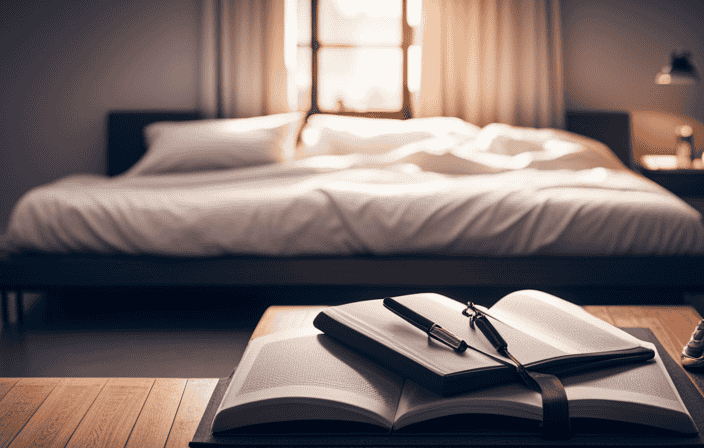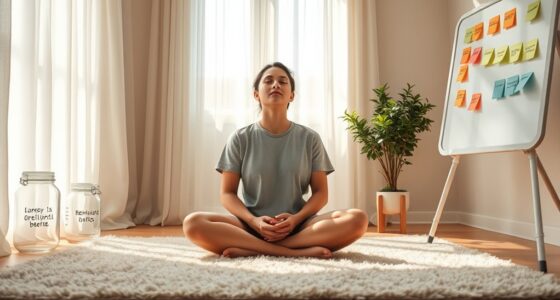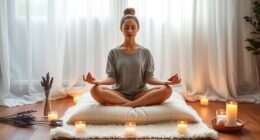In a world full of continual stress and demands, it is crucial to prioritize moments of relaxation. As the saying goes, ‘Relaxation is not a luxury; it is a necessity.’ It is important to recognize the benefits of relaxation and how it can improve our overall well-being.
From improving sleep patterns to reaping the benefits of exercise, and engaging in calming activities, there are various ways to achieve a calm mind. So, let’s dive into the world of relaxation and discover the secrets to a more peaceful and rejuvenated life.
Key Takeaways
- Relaxation is important for improving blood circulation, relieving stress and anxiety, and allowing the body to repair and rejuvenate.
- Good sleep patterns are essential for relaxation and can be improved by understanding sleep science.
- Exercise raises heart rate and releases chemicals that promote relaxation, making it a beneficial activity for relaxation and overall well-being.
- Engaging in activities such as reading, puzzles, music, mindfulness practices, and self-care can contribute to relaxation and a calm mind.
The Importance of Relaxation
https://www.youtube.com/watch?v=ZGkXt26gx_c
I prioritize relaxation because it improves blood circulation, relieves stress and anxiety, and allows my body to repair and rejuvenate.
Taking time to relax is essential for my overall well-being. When I relax, my body can focus on its repair work, ensuring that I stay healthy and strong.
Not only does relaxation help me physically, but it also has a positive impact on my mental well-being. It quiets my mind and helps me find balance in my daily life.
I make sure to set aside time for relaxation every day, whether it’s through reading, doing puzzles, or practicing mindfulness.
By prioritizing relaxation, I am able to take care of myself and live a more peaceful and calm life.
Sleep Science
Understanding the science behind sleep can provide valuable insights into improving the quality of rest. Good sleep patterns are essential for relaxation and overall well-being. Here are some key points to consider:
-
Sleep architecture: Our sleep is divided into different stages, including REM (Rapid Eye Movement) and non-REM sleep. Understanding the different stages can help optimize sleep quality.
-
Circadian rhythm: Our body has an internal clock that regulates sleep-wake cycles. Aligning our sleep schedule with this rhythm can promote better rest.
-
Sleep hygiene: Creating a conducive sleep environment, practicing a relaxing bedtime routine, and avoiding stimulants like caffeine can improve sleep hygiene.
-
Sleep disorders: Identifying and addressing sleep disorders like insomnia or sleep apnea is crucial for restful sleep.
-
Sleep duration: The recommended amount of sleep varies by age, but most adults need 7-9 hours of sleep per night. Prioritizing sufficient sleep time is essential for relaxation.
By understanding sleep science and implementing healthy sleep habits, we can enhance our relaxation and overall well-being.
Benefits of Exercise
Engaging in physical activity boosts my mood and promotes a sense of well-being. Exercise has numerous benefits for relaxation and overall well-being. When I work out, my heart rate increases, and my body releases chemicals that promote relaxation. It’s like a natural stress reliever.
Not only does exercise clear my mind, but it also serves as a form of meditation. I find that when I engage in sports or other physical activities, I can take a break from daily worries and focus on the present moment.
Additionally, exercising in the morning increases my energy levels throughout the day. It’s a great way to start my day on a positive note.
So, whether it’s going for a run, practicing yoga, or playing a game of basketball, I always make sure to prioritize physical activity for its relaxation benefits.
Activities for Relaxation
Reading a good book helps me unwind and find relaxation. It’s a great way to escape from the stresses of everyday life and immerse myself in a different world. Not only does reading provide entertainment, but it also offers numerous benefits for relaxation.
Research has shown that reading can lower heart rate and reduce muscle tension, promoting a sense of calm. It can also improve cognitive function and increase empathy.
Engaging in puzzles is another activity that helps me relax while keeping my mind engaged. Solving puzzles, whether it’s a crossword or Sudoku, requires focus and concentration, which can help distract from worries and promote a state of relaxation.
Additionally, listening to music has been proven to have a soothing effect on the mind and body. Slow tempo music can lower blood pressure and heart rate, inducing a state of relaxation.
Overall, engaging in these activities can provide a much-needed break and contribute to a calm and rejuvenated mind.
Delta-8-THC and Relaxation
Delta-8-THC has become a popular choice for relaxation due to its milder and less intense high compared to delta-9-THC. This compound, found in cannabis, offers a way to unwind and promote a sense of calm.
Here are two reasons why delta-8-THC can evoke an emotional response in the audience:
-
Delta-8-THC may help reduce anxiety: Studies suggest that delta-8-THC has anxiolytic properties, meaning it may alleviate feelings of anxiety and promote relaxation. This can be particularly beneficial for individuals who struggle with stress and tension.
-
Delta-8-THC can provide a sense of euphoria: Like delta-9-THC, delta-8-THC can induce a feeling of euphoria. However, its effects are generally described as smoother and less overwhelming. This can contribute to a more relaxed and enjoyable experience.
When considering delta-8-THC for relaxation purposes, it is important to use it responsibly and in moderation. As with any cannabis product, it is recommended to consult with a healthcare professional before use.
Relaxation Techniques
I find that practicing deep breathing exercises helps me unwind and find inner peace.
Deep breathing is a relaxation technique that involves taking slow, deep breaths in through the nose and exhaling slowly through the mouth. This technique activates the body’s relaxation response and helps to calm the mind.
Research has shown that deep breathing can reduce stress, lower blood pressure, and promote a sense of calmness.
One effective deep breathing exercise is called the 4-7-8 technique. To do this, inhale deeply through the nose for a count of 4, hold the breath for a count of 7, and exhale slowly through the mouth for a count of 8. Repeat this cycle several times to experience the relaxing effects of deep breathing.
Self-Care for Relaxation
Engaging in regular self-care practices can greatly contribute to achieving a state of relaxation and overall well-being. Taking care of oneself is not selfish; it is necessary for maintaining a healthy mind and body.
Self-care can take many forms, such as taking a warm bath, practicing mindfulness, or indulging in a hobby. These activities help to reduce stress and promote relaxation.
Additionally, self-care involves setting boundaries and prioritizing personal needs. It is important to listen to your body and give it the rest it deserves.
Incorporating self-care into your daily routine can have a profound impact on your mental and physical well-being, allowing you to better manage stress and improve your overall quality of life.
So take the time to nurture yourself and make self-care a priority. You deserve it!
Responsible Use of Delta-8-THC
Using delta-8-THC responsibly involves being mindful of dosage and understanding its potential effects.
Delta-8-THC is a compound found in cannabis known for its relaxing properties. It has gained popularity as a relaxation aid due to its milder and less intense high compared to delta-9-THC.
However, it is important to remember that delta-8-THC is still a psychoactive substance and should be used with caution.
Start with a low dosage and gradually increase if needed, paying attention to how your body responds.
It is also crucial to be aware of the legal status of delta-8-THC in your area and only purchase products from reputable sources.
As with any cannabis product, responsible use includes avoiding driving or operating heavy machinery while under the influence.
By practicing responsible usage, delta-8-THC can be a tool for relaxation and promoting a calm mind.
Frequently Asked Questions
Are there any potential side effects of using delta-8-THC for relaxation?
There can be potential side effects of using delta-8-THC for relaxation, such as dry mouth, red eyes, increased heart rate, and impaired coordination. It may also cause drowsiness and affect cognitive function.
How can mindfulness practices contribute to relaxation?
Mindfulness practices, like meditation and deep breathing, help relax the mind and body. By focusing on the present moment, they reduce stress and promote a sense of calm. Regular practice can enhance overall well-being and improve relaxation.
What are some self-care activities that can help promote relaxation and overall well-being?
Some self-care activities that can promote relaxation and overall well-being include taking a warm bath, practicing deep breathing exercises, engaging in hobbies or creative activities, spending time in nature, and practicing gratitude or journaling.
Can exercise be counterproductive for relaxation if done too close to bedtime?
Exercise too close to bedtime can be counterproductive for relaxation. It stimulates the body, raises heart rate, and releases chemicals that promote wakefulness. Instead, opt for calming activities like stretching or meditation before bed to promote better sleep.
Is there a recommended dosage or limit for using delta-8-THC as a relaxation aid?
There is no official recommended dosage or limit for using delta-8-THC as a relaxation aid. It is important to start with a low dose and listen to your body’s response. Consult with a healthcare professional for personalized guidance.









